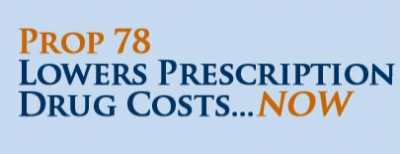California Proposition 78, Prescription Drug Discount Program Initiative (2005)
| California Proposition 78 | |
|---|---|
 | |
| Election date November 8, 2005 | |
| Topic Healthcare | |
| Status | |
| Type State statute | Origin Citizens |
California Proposition 78 was on the ballot as an initiated state statute in California on November 8, 2005. It was defeated.
A "yes" vote supported establishing a state drug discount program to reduce prices for prescription drugs for Californians with an income at or below 300 percent of the federal poverty level. |
A "no" vote opposed establishing a state drug discount program to reduce prices for prescription drugs for Californians with an income at or below 300 percent of the federal poverty level. |
Election results
|
California Proposition 78 |
||||
|---|---|---|---|---|
| Result | Votes | Percentage | ||
| Yes | 3,199,193 | 41.50% | ||
| 4,508,873 | 58.50% | |||
-
- Results are officially certified.
- Source
Measure design
Proposition 78 would have established a state drug discount program to reduce prices for prescription drugs for Californians with an income at or below 300 percent of the federal poverty level.
Proposition 78 competed with Proposition 79. Both propositions failed.
Text of measure
Ballot title
The ballot title for Proposition 78 was as follows:
| “ | ” |
Ballot summary
The ballot summary for this measure was:
| “ |
• Establishes discount prescription drug program, overseen by California Department of Health Services. • Enables certain low- and moderate-income California residents to purchase prescription drugs at reduced prices. • Authorizes Department: to contract with participating pharmacies to sell prescription drugs at agreed-upon discounts negotiated in advance; to negotiate rebate agreements with participating drug manufacturers. • Imposes $15 annual application fee. • Creates state fund for deposit of drug manufacturers’ rebate payments. • Requires Department’s prompt determination of residents’ eligibility, based on listed qualifications. • Permits outreach programs to increase public awareness. • Allows program to be terminated under specified conditions. | ” |
Full Text
The full text of this measure is available here.
Fiscal impact
- See also: Fiscal impact statement
The fiscal estimate provided by the California Legislative Analyst's Office said:[1]
| “ |
|
” |
Support

Supporters
- Kristine Yahn, RN, executive director of Californians for Patient Care[1]
- Carolyn Peterson, RN, MS, AOC, chief operating officer of Community Hospice[1]
- Doris Luna, RN, a certified pediatric oncology nurse at the UC-Davis Medical Center[1]
- Tom Murphy, chair of the California Arthritis Foundation Council[1]
- Rusty Hammer, president of the Los Angeles Area Chamber of Commerce[1]
- James S. Grisolia, M.D., senior vice-president of the Epilepsy Foundation of San Diego County[1]
Official arguments
The official voter guide arguments in favor of Proposition 78 were signed by Kristine Yahn, RN, executive director of Californians for Patient Care; Carolyn Peterson, RN, MS, AOC, chief operating officer of Community Hospice; and Doris Luna, RN, a certified pediatric oncology nurse at the UC-Davis Medical Center:[1]
| “ |
Proposition 78 offers Californians struggling with high prescription drug costs real help, right now. Prop. 78 is a proven program that can take effect immediately, and will deliver critically needed prescription drug discounts to millions of seniors and low income, uninsured Californians. Known as Cal Rx, Proposition 78 offers Californians the best prescription drug discount program in the country. It is an improved version of a successful program already operating in Ohio that is delivering discounts averaging 31%, saving consumers $15.31 on every covered prescription. Every major prescription drug manufacturer participates in the Ohio program. 'This program is a lifesaver. My family saves $150 a month on prescription drugs for my husband’s heart condition. For us, it’s a miracle.' Robin Ford, Canton, Ohio Proposition 78 is even better than the Ohio program. The California Department of Health Services concludes that the Cal Rx program enacted by Proposition 78 will result in discounts of over 40% to millions of eligible Californians. State officials say that Cal Rx prices will compare favorably to prices in Canada. Here’s how Proposition 78 works:
to anyone in California and pharmacists will provide additional discounts. According to state officials, the average discount will be at least 40% off regular retail prices.
'Proposition 78 offers real hope to millions of Californians who currently don’t have access to affordable prescription medications. We want all Californians in need to have access to prescription medications and Proposition 78 will do that.' Rick Roberts, HIV/AIDS Patient and Activist Proposition 78 enjoys bipartisan support. It is supported by groups representing seniors, patients, taxpayers, and small businesses across the state. A Los Angeles Times news report found Prop. 78, 'would offer one of the most extensive discounts in the country.' Proposition 78 will bring real help, right now. It can go into effect immediately and begin delivering deep discounts on prescription drugs, helping millions of seniors and low income, uninsured Californians. There are two prescription drug discount proposals on the ballot, but only Proposition 78 will work. Unlike the other proposal, Prop. 78 doesn’t require federal approval, provides discounts on a wider range of drugs, doesn’t depend on a big government bureaucracy to be implemented, and won’t result in costly litigation by trial lawyers. Please, join seniors, taxpayers, consumers, patient advocates, health care professionals, and small businesses, and VOTE YES on Proposition 78.[2] |
” |
Opposition

Opponents
- Nancy J. Brasmer, president of the California Alliance for Retired Americans[1]
- Richard Holober, executive director of the Consumer Federation of California[1]
- Jacqueline Jacobberger, president of the League of Women Voters of California[1]
- Barbara A. Brenner, executive director of Breast Cancer Action[1]
- Ramon Castellblanch, policy advisor to the Senior Action Network[1]
- Kathy J. Sackman, RN, president of the United Nurses Association of California[1]
Official arguments
The official voter guide arguments opposing Proposition 78 were signed by Nancy J. Brasmer, president of the California Alliance for Retired Americans; Richard Holober, executive director of the Consumer Federation of California; and Jacqueline Jacobberger, president of the League of Women Voters of California:[1]
| “ |
THE DRUG LOBBY IS SPENDING HISTORIC AMOUNTS TO BLOCK THE REAL SOLUTION FOR FAIR DRUG PRICES Prop. 78 is a smokescreen designed and bankrolled with tens of millions of dollars from the prescription drug lobby to block Prop. 79, a real discount solution put forward by consumer, health, and senior groups. Under their cynical strategy, if both measures get a majority, the one with more votes becomes law. Newspapers report that just one contribution from GlaxoSmithKline for $8.5 million could be 'the largest ever from a corporation to a California campaign.' Drug companies donated $50 million to Prop. 78 by mid-July, on track to run what could be the most expensive initiative campaign in California history. Jan Faiks, VP with PhRMA, the industry’s lobbying arm, told the Los Angeles Times 'the industry would spend ‘whatever it takes’ to defeat [Prop. 79].' PROP. 78 RELIES ON MANUFACTURERS TO VOLUNTEER DISCOUNTS: A PLAN PROVEN TO FAIL Prop. 78 relies on drug manufacturers to voluntarily lower their prices and does not allow the state of California to enforce the program. California tried this voluntary approach in 2001. The Golden Bear State Pharmacy was designed to offer seniors voluntary discounts on prescription medications. More than 500 drug manufacturers were invited to participate, yet only 14 agreed. Unable to implement it successfully, Governor Schwarzenegger closed the program. According to news reports, the drug companies said they didn’t participate in Golden Bear because if they did, they would have to give the federal government the same rebates they were giving California seniors. Have they really changed their minds four years later? Can we trust the manufacturers to voluntarily lower their prices now? No. PROP. 78’S DISCOUNTS CAN END AT ANY TIME The drug lobby buried a provision in Prop. 78 that allows them to effectively close their discount program when too few manufacturers voluntarily lower their prices. As stated in their initiative, Prop. 78 could end at any time if there are too few participating manufacturers, or insuffi cient discounts, or too few participating consumers. Make no mistake, this provision was included by the drug companies so they can end the program at any time and protect their profit margins. FEWER PEOPLE ARE ELIGIBLE, DISCOUNTS ARE LESS Half as many Californians are eligible for discounts under Prop. 78 as under Prop. 79. Prop. 78 provides no discounts to many uninsured Californians, those with catastrophic medical bills, and the chronically ill such as cancer and diabetes patients with inadequate drug coverage. The discounts offered by Prop. 78 are based on the 'lowest commercial price' set by the drug companies. These discounts could be anywhere from 15 to 40 percent— significantly less than Prop. 79’s discounts. VOTE NO on PROP. 78, a smokescreen by the pharmaceutical industry to block the real solution to high prices. Instead, VOTE YES on PROP. 79 for fair prescription drug prices.[2] |
” |
Path to the ballot
- See also: California signature requirements
In California, the number of signatures required for an initiated state statute is equal to 5 percent of the votes cast at the preceding gubernatorial election. For initiated statutes filed in 2005, at least 373,816 valid signatures were required. The signatures needed to qualify Proposition 78 for the ballot were collected by two different petition drive management companies, PCI Consultants, Inc. and Bader & Associates, Inc..
- PCI Consultants, Inc. was paid $1,233,393.00.[3]
- Bader & Associates, Inc. was paid $1,182,004.00.[3]
See also
External links
- Official California Voter Guide
- Full text of 78
- Proposition 78 on the Smart Voter Guide
- Guide to Proposition 78 from the California Voter Foundation
- Summary of donors to and against 78 from Cal-Access
- Donors for and against Proposition 78 from Follow The Money
Supporters:
Opponents:
Footnotes
- ↑ 1.00 1.01 1.02 1.03 1.04 1.05 1.06 1.07 1.08 1.09 1.10 1.11 1.12 1.13 1.14 University of California Hastings, "Voter Guide," accessed April 1, 2021
- ↑ 2.0 2.1 2.2 Note: This text is quoted verbatim from the original source. Any inconsistencies are attributable to the original source.
- ↑ 3.0 3.1 Cal-Access, "Expenditure details, Yes on 78," accessed April 1, 2021



